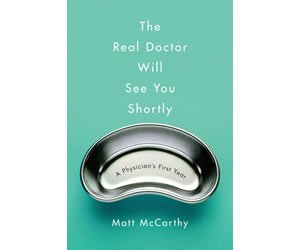Last Updated on June 26, 2022 by Laura Turner
I was having dinner with my editor three years ago, and he asked if I’d ever thought of writing a book about medicine. I had kept a journal during my intern year, but I was hesitant to write about my experiences. Some were great, but a lot weren’t and I wasn’t sure I could convey the difficult moments fairly. My editor and I spent a long time working on the tone of the book, trying to capture just how terrifying and inspiring that first year is.
2. What would you say is the most controversial part of the book?
The trickiest thing is writing about your own patients. Some medical writers believe we should only write about patients if we have their written consent. Most journalists tend to disagree with this and you occasionally see arguments about it break out on social media. In a few cases, I wasn’t able to get written consent for my book, so I had to change identifying details to protect anonymity. It’s not just about complying with HIPAA. It’s about changing personal details so thoroughly that you’re really protecting identities. Patients are vulnerable, and we have to be careful when we write about them.
3. Is it difficult to write so honestly about your experience as an intern?
At first, it was very difficult. I worried that if I shared stories about my own mistakes, readers and colleagues would think I’m a bad doctor. But at some point, I stopped worrying about that. I know there are a lot of young doctors out there who are struggling, and I wanted them to know they’re not alone.
4. What do you want readers to get out of reading your book?
My patients are often frustrated that they see so many different faces everyday. I’m at a large teaching hospital, which means there’s always a medical student, intern, resident, fellow, or attending popping in to ask the same questions. A lot of patients will say to me, “Aren’t you guys talking to each other? I just answered that.” After you read my book, you’ll have a better understanding of why the system works the way it does. And medical students will get a better sense of what intern year is really like. I had no idea what I was in for!
5. How has the book been received by your colleagues?
I wasn’t sure what the response would be. Would colleagues think less of me because I acknowledged my shortcomings? Would patients? The most frequent response I get from doctors is, “Your book reminds me of my own intern year!” which is surprising, because I had some pretty weird stuff happen to me. Best of all is that the doctors I wrote about really like the book, and I was just invited to speak at the hospital where it all takes place. We’re all struggling to find meaning in our work, and my book deals with how I learned to cope with the stress of practicing medicine.
6. Describe a typical day of work for you.
Work begins around 5:45am when my eleven-month-old son wakes up and starts screaming his head off. My wife (a transplant nephrologist at Columbia) and I tend to him and then we rush off for morning rounds. At 8am, the overnight intern presents new admissions to our team of medical students and residents and then we discuss our follow-up patients until 9:30am or so. Then we all go examine the new patients together, which can take another hour. Next, we have social work rounds and teaching conferences. From 2pm to 4pm I’ll try to write some notes, respond to emails, and read a few medical journals. At 4pm, we have afternoon rounds. Somewhere around 6pm I head home to see my wife and kid and write more notes.
7. When and where do you write? Do you have a routine involved in writing?
I tend to write during my morning commute. I’m the guy in the back of the crosstown bus, tapping away on his iPhone, writing down some thought that I want to flesh out later in the day. Most of my book was initially written on an iPhone, as an email to myself.
8. What’s the best thing about being an author?
My book opens with a scene where a senior surgeon at Harvard Medical School takes me under his wing and believes in me at a time when I didn’t believe in myself. He has since passed away, and when his daughter read the passage, she said I had captured the essence of her father. That was unquestionably the best thing about writing the book. Being an author is kind of like being a doctor: you get to meet so many people you otherwise wouldn’t.
9. What are you working on now?
I have several projects going right now, but none of them are far enough along that they’d be worth mentioning. Now that the book is out, I’m finally getting back to the laboratory to finish some experiments!
10. Do you have any favorite authors or favorite books?
My favorite book is Never Let Me Go by Kazuo Ishiguro. But it’s not for everyone. When a friend asks for a book recommendation, I usually go with The Art of Fielding by Chad Harbach.
11. What was the worst part of being an intern? If you have a favorite part, what is it?
Being an intern is rough! The mental and physical exhaustion is hard on everyone and there’s a saying in my book that “everyone breaks.” It’s true, at some point during intern year, something bad will happen and you’ll break. The question is: will you be able to recover from that? The best part of intern year is that you meet so many wonderful people who are going through the same awful stuff you are. There’s an incredible camaraderie that develops.
12. Any parting advice for interns?
I gave a talk last week and someone asked if there are any traits that make someone a great intern. I was able to think of two: toughness and kindness. You have to be mentally and physically tough to survive the year, but intern year isn’t just about surviving. To really thrive, you’ve got to be tough while being kind to your colleagues and your patients, and that’s not easy to do.
At first, it was very difficult. I worried that if I shared stories about my own mistakes, readers and colleagues would think I’m a bad doctor. But at some point, I stopped worrying about that. I know there are a lot of young doctors out there who are struggling, and I wanted them to know they’re not alone.
4. What do you want readers to get out of reading your book?
My patients are often frustrated that they see so many different faces everyday. I’m at a large teaching hospital, which means there’s always a medical student, intern, resident, fellow, or attending popping in to ask the same questions. A lot of patients will say to me, “Aren’t you guys talking to each other? I just answered that.” After you read my book, you’ll have a better understanding of why the system works the way it does. And medical students will get a better sense of what intern year is really like. I had no idea what I was in for!
5. How has the book been received by your colleagues?
I wasn’t sure what the response would be. Would colleagues think less of me because I acknowledged my shortcomings? Would patients? The most frequent response I get from doctors is, “Your book reminds me of my own intern year!” which is surprising, because I had some pretty weird stuff happen to me. Best of all is that the doctors I wrote about really like the book, and I was just invited to speak at the hospital where it all takes place. We’re all struggling to find meaning in our work, and my book deals with how I learned to cope with the stress of practicing medicine.
6. Describe a typical day of work for you.
Work begins around 5:45am when my eleven-month-old son wakes up and starts screaming his head off. My wife (a transplant nephrologist at Columbia) and I tend to him and then we rush off for morning rounds. At 8am, the overnight intern presents new admissions to our team of medical students and residents and then we discuss our follow-up patients until 9:30am or so. Then we all go examine the new patients together, which can take another hour. Next, we have social work rounds and teaching conferences. From 2pm to 4pm I’ll try to write some notes, respond to emails, and read a few medical journals. At 4pm, we have afternoon rounds. Somewhere around 6pm I head home to see my wife and kid and write more notes.
7. When and where do you write? Do you have a routine involved in writing?
I tend to write during my morning commute. I’m the guy in the back of the crosstown bus, tapping away on his iPhone, writing down some thought that I want to flesh out later in the day. Most of my book was initially written on an iPhone, as an email to myself.
8. What’s the best thing about being an author?
My book opens with a scene where a senior surgeon at Harvard Medical School takes me under his wing and believes in me at a time when I didn’t believe in myself. He has since passed away, and when his daughter read the passage, she said I had captured the essence of her father. That was unquestionably the best thing about writing the book. Being an author is kind of like being a doctor: you get to meet so many people you otherwise wouldn’t.
9. What are you working on now?
I have several projects going right now, but none of them are far enough along that they’d be worth mentioning. Now that the book is out, I’m finally getting back to the laboratory to finish some experiments!
10. Do you have any favorite authors or favorite books?
My favorite book is Never Let Me Go by Kazuo Ishiguro. But it’s not for everyone. When a friend asks for a book recommendation, I usually go with The Art of Fielding by Chad Harbach.
11. What was the worst part of being an intern? If you have a favorite part, what is it?
Being an intern is rough! The mental and physical exhaustion is hard on everyone and there’s a saying in my book that “everyone breaks.” It’s true, at some point during intern year, something bad will happen and you’ll break. The question is: will you be able to recover from that? The best part of intern year is that you meet so many wonderful people who are going through the same awful stuff you are. There’s an incredible camaraderie that develops.
12. Any parting advice for interns?
I gave a talk last week and someone asked if there are any traits that make someone a great intern. I was able to think of two: toughness and kindness. You have to be mentally and physically tough to survive the year, but intern year isn’t just about surviving. To really thrive, you’ve got to be tough while being kind to your colleagues and your patients, and that’s not easy to do.
The Real Doctor Will See You Shortly is available for purchase on Amazon.com.


